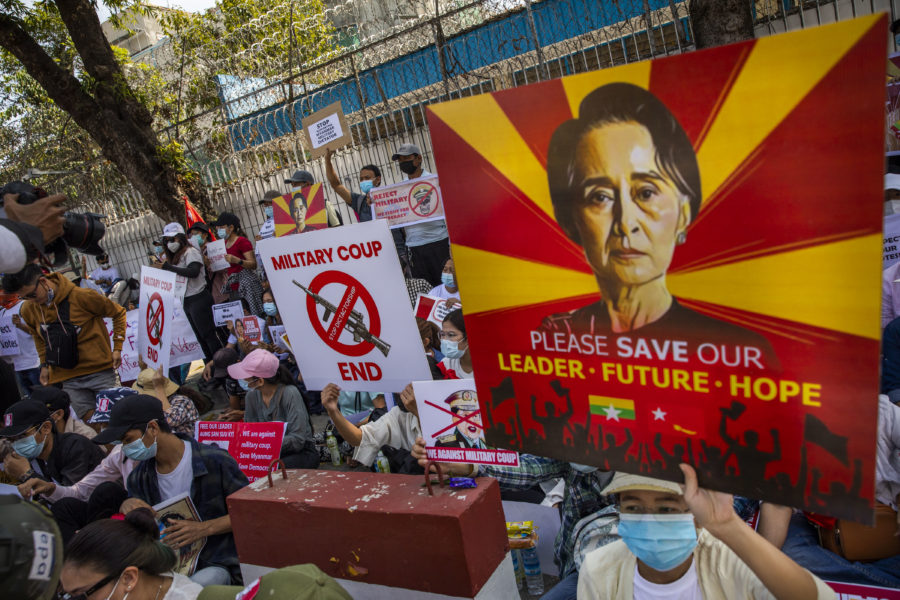General Aung San died a national hero when he was assassinated by his political rival Galon U Saw on July 19, 1947. More than 70 years after his death, the generals who call him the father of Myanmar’s army are desperate to get rid of his daughter.
Daw Aung San Suu Kyi also became a national icon when she led Myanmar’s democracy struggle against the military dictatorship in 1988. She, however, has met a fate worse than her father’s, being subjected to three decades of oppression at the cruel hands of the generals.
Myanmar was the most developed democracy in Southeast Asia in the years that followed independence. Thanks to the mismanagement of military dictator General Ne Win, who ruled the country under a one-party dictatorship from 1962 to 1988, Myanmar was reduced to being one of the least developed countries in the world.
The pro-democracy uprising in 1988 gave birth to a democratic icon. Addressing a mass rally of 500,000 people at the western gate of the Shwedagon Pagoda on Aug. 26, 1988, Daw Aung San Suu Kyi, then 43, rose to lead Myanmar’s struggle for democracy.
In her 30-minute speech, she stressed the need for unity to achieve democracy. She appealed to the armed forces to become a force in which the people can place their trust and reliance. “The armed forces are meant for this nation and people and they should be such a force having the honor and respect of the people,” she said.
Her speech was touching, but not to the military. On Sept. 18, 1988, dictator Ne Win summoned army chief General Saw Maung and military intelligence chief Major General Khin Nyunt to his office, and ordered them to stage a coup. That evening, Myanmar found herself under military rule again.
The two military leaders used every dirty trick in the book to oppress Daw Aung San Suu Kyi and her party, the National League for Democracy. It held multiparty democratic elections in 1990 as it had promised. But 10 months before the vote, it put Daw Aung San Suu Kyi under house arrest on July 20, 1989.
The NLD secured a landslide victory in the 1990 poll, winning in more than 90 percent of constituencies, but the military refused to hand over power. It went further and forced the NLD to expel Daw Aung San Suu Kyi, threatening to disband it if it did not do so. The party expelled her in 1991 while she was under house arrest.
She spent a total of 15 years under house arrest from 1989 to 2010, interspersed with brief periods when she was released. Away from her family, she was confined at her residence in Yangon. Military dictator Senior General Than Shwe met her three times during those years, but only to reduce international pressure on his regime.
In the years when she was free, the military regime was always happy to disrupt her pro-democracy campaign trips. In November 1996, military-backed thugs attacked her car on the Kaba Aye Pagoda Road, one of the mains roads in Yangon, in broad daylight. The car was badly damaged.
In June 1998, thugs beat youths attending a biweekly reading session at her residence. She was struck in the back and her left shoulder was bruised when she intervened.
The worst such case was the attempted assassination of Daw Aung San Suu Kyi in 2003, carried out at the instruction of Than Shwe. In what has become known as the Depayin (also Tabayin) Massacre, thousands of regime-backed thugs armed with swords, spears and sharpened bamboo sticks attacked Daw Aung San Suu Kyi’s motorcade in Kyee Village, on the outskirts of Sagaing Region’s Depayin Township, on May 30, 2003.
Daw Aung San Suu Kyi, her driver and some other NLD members managed to escape the massacre, but she was again put under house arrest.
She was released in 2010, and was elected to the Lower House in the 2012 by-election. Her party won a landslide in the 2015 general election, and less than a month later, she was invited to meet then dictator Than Shwe, whom she greeted as “uncle”. The details of their discussions have never been disclosed.
As the military-drafted 2008 Constitution bars her from becoming the country’s president, she led her NLD government in a de facto capacity for the next five years as the State Counselor. The NLD government attempted to amend the Constitution to reduce the role of the military in Myanmar’s politics and transform the Myanmar military into a standard army, angering military chief Min Aung Hlaing, Than Shwe’s handpicked successor.

The NLD won an even greater landslide victory in the 2020 election and while international observers said the voting was generally free and fair, Min Aung Hlaing seized power in a coup on Feb. 1, claiming the poll was marred by fraud.
Detained in an unknown location in Naypyitaw, Daw Aung San Suu Kyi now faces up to 75 years in jail on multiple charges.
In her 30-year-long struggle for democracy, Daw Aung San Suu Kyi has battled military leaders Ne Win, Saw Maung, Than Shwe, Khin Nyunt and Min Aung Hlaing. Unquestionably, what they have done to her is far more evil than the actions of Galon U Saw, who was sent to the gallows for killing Gen. Aung San.
You may also like these stories:
Myanmar Junta Putting Lives of Political Prisoners at Risk in COVID-19 Prison Outbreaks
Banning the NLD Won’t End Resistance to Military Rule

















